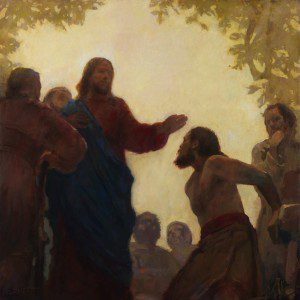This talk was given by Kristen Blair, my niece, on Sunday, December 14th, 2014.
Quintessential Truth: Metanoeo
I could never put my mission experience into words. It means everything to me. But the closest I can come to describing the miracle I experienced is by talking about what I would call the quintessential representative of my mission: movement, which is another word for repentance. I never really applied the word “quintessential” until I served a mission. The concept, sure, I understood that: it means an example that most typically represents something else. But it wasn’t until I sat in a Zone Conference in March of 2013 and heard about repentance that I started to get it.
We’ve all heard about repentance; Usually, the thought of it brings the connotation of guilt and regret for some wrong-doing. We associate the word with the feeling of falling short, of needing to beg for mercy, of our depraved mortal state. The words, ‘repent,’ or ‘repentance’ are used on almost every page, often multiple times, throughout holy writ, thus erroneously crystalizing in our minds the notion that we are despicable and hardly worthy of standing in God’s presence. Jonathan Edwards wrote about biblical passages calling us to repentance in a famous sermon titled “Sinners in the Hands of an Angry God.” He said, “The God that holds you over the pit of hell, much as one holds a spider, or some loathsome insect over the fire, abhors you, and is dreadfully provoked: his wrath towards you burns like fire; he looks upon you as worthy of nothing else, but to be cast into the fire,” And I am afraid that for a long time, the concept of repentance was just a constant reminder to me of how awful I was.
First written in Hebrew, the bible’s original word for our modern ‘repentance’ was ‘shub,’ which means, to turn. To turn away from sin, to turn towards God. For example, as used in Heleman chapter 7 verse 17: “Turn ye, turn ye unto the Lord your God.” From Hebrew, the Bible was then translated to Greek, and shub became ‘metanoeo,’ which essentially means transformation. It shares the root of the word “metamorphosis” and “new”; meaning new life, new being, new mind, new heart. As described in the plea of Ezekiel: “Make you a new heart and a new spirit” (Ezekiel 18:31). Unfortunately, we didn’t retain the Greek notion of repentance. From Greek the bible was translated into Latin and metanoeo became poenitere, the root of which is shared in our words punish and penance. From this definition springs what is often deeply rooted into our psyche–a notion of change that involves seemingly constant punishment, remorse, and self deprecation–sinners in the hands of an angry God–when what was intended was a plea for us to “come to ourselves” and lay aside the weight of those things in mortality that burden us. It is metanoeo, not poenitere, that our Father is offering. Like Prince Hamlet says to his friend Horatio in William Shakespeare’s classic play, “There are more things in heaven and earth than are dreamt of in your philosophy.” So says God to us, and so is our message to the world. There is more.

Allow me a story: I worked with a missionary who believed in the atonement of Jesus Christ for everyone but herself. In her mind, of course everyone else made mistakes, but theirs didn’t matter to a merciful God nearly the ways hers did. To Him, she was sure she was barely worthy of a sideways glance. No matter how much she did, she never felt she was good enough. This missionary, was me. I don’t know that could tell you exactly what changed, but I can tell you for sure that I moved. I love the french poem by Guilliame Apollinaire, that reads:
“Come to the edge, he said.
We are afraid, they said.
Come to the edge, he said.
They came to the edge,
He pushed them and they flew.
I had questions and fears and doubts, and I realized that they were holding me back from complete consecration. I needed to give my fears to God. I am still trying to give my fears to Him. It is hard. But the process is metanoeoe. Learning that comes directly from God, because we are assisting Him in His work, not the other way around. Metanoeo is a catalyst for every other redemptive and uplifting doctrine of the gospel to pour out upon us, to wash into the very blood and bones of our beings, and to actually change us, to consecrate us.
Though truth was always available to me, the atonement was always available to me, it is not until I really started to apply the impetus of metanoeo that these truths and powers were internalized and began to become not just a stagnant doctrinal understanding in my mind, but an actual presence that doesn’t simply assist me day to day but which has become a life force, I cannot live without it. This is why our Father in heaven begs us to repent. That movement is the only way for us to begin to draw the available truth into our very blood and souls. Quintessential truth: Metanoeo, change.
With a nametag, I heard over and over and over, “If God really loved me, He wouldn’t have let this happen to me.” And I saw immense suffering. Suffering my companions and I felt would break our hearts. But I can testify before God, angels, and witnesses more emphatically now than I ever could before seeing such suffering, that God is not in the business of lollipops and bandaids! He isn’t there so that we can shut our eyes and breeze through life. He is not fire insurance to the natural byproducts of mortality, including underserved sorrows, sins of others, death, tragedy, and so on. Instead of taking it from us, He has provided a Savior, Jesus Christ, to make these things redemptive if we choose them to be. Real love is not just a feeling of fondness. Real love is not handholding and babying protection from life. Real love enables us. He enables us to become. That is the atonement of Jesus Christ. It is not a “quick fix.” It is when we offer all of ourselves to Him and move that he can heal, capacitate, and in short eternally change our souls so that mercy has claim on us.
For a long time my thoughts and prayers as a missionary were full of phrases like, “I’m sorry, Heavenly Father, that I’m not good enough for you. I’m sorry that I’m always falling short. I’m sorry that I’m so inadequate. I’m sorry that I keep messing up. I’m sorry that I’m such a bad missionary, I’m sorry that I’m just not measuring up.” I, I, I, me, me, me. Finally, I started to realize, that when I was thinking and praying like that, I was thinking and praying all about me. And it’s not about me. When I feel discouraged and inadequate, I am relying on myself, on my own strength. And we, all of us, full-time missionary or not, have been promised repeatedly that we do not have to rely on our own strength. He has promised us His strength. When I was baptized a member of The Church of Jesus Christ of Latter-day Saints, I covenanted to forsake an ‘I’ life forever. It is a ‘we,’ life. I bear His name, I represent Him, I reflect His teachings, I am a living witness of His truth, and I submit my whole soul as an offering to him (Omni 1:26).
I believe that the biggest inhibitor to people’s progression–and I saw this again and again and again–is a skewed perception of their own self worth. When we don’t know who we really are, why would it be important to us to read the scriptures or pray? We think to ourselves, “God wouldn’t want to hear from me anyway, I’m not spiritual enough to “get” the scriptures, I’ll never make it to the temple, I’m not the kind of person that could keep a baptismal commitment,” and the list goes on and on. I taught a wonderful lady named Christina when I served in a little hick town of Massachusetts, Billerica. She struggled to find a sense of worth when her life was filled with so much undeserved pain and heartbreak. Like me, Christina could see and understand God’s love for others, but struggled to feel it for herself. She didn’t feel that she was worth it. As we talked with her one day, that quintessential truth of the Gospel of Jesus Christ ballooned in my mind, and flooded out to her: metanoeo. The Lord, we told her, gives us signs and tokens to show us our own worth–both in tangibles and intangibles. One of those tangible signs from Him is in the ordinance of baptism–having the chance to literally wear the name of Christ—how much more could he be showing us our worth? We are worth taking upon ourselves the name of Jesus Christ. We are worth living a higher law, forsaking the dross of this mortal world.
This, then, is a gospel of joy and redemption. It is a gospel with the weight not on our shoulders alone. It is not a gospel of checklists and perfectionism. It is a gospel of life, life eternal. He “waketh morning to morning” (2 Nephi 7:4) to succor us, to walk with us, and He teaches us this same quintessential truth that has been reverberating through my psyche and which I have been focusing on today: metanoeo. It is everywhere when you start really looking for it. One of my beloved companions, now one of my dearest friends, Sister Alex White and I taped what became our companionship mantra to the door of our apartment for three months. Every morning, we read these words about metanoeo: “Preach unto them [we interested metanoeo], and faith on the Lord Jesus Christ; teach them to humble themselves and to be meek and lowly in heart; teach them to withstand every temptation of the devil, with their faith on the Lord Jesus Christ.Teach them to never be weary of good works, but to be meek and lowly in heart; for such shall find rest to their souls.Yea, and cry unto God for all thy support; yea, let all thy doings be unto the Lord, and whithersoever thou goest let it be in the Lord; yea, let all thy thoughts be directed unto the Lord; yea, let the affections of thy heart be placed upon the Lord forever. Counsel with the Lord in all thy doings, and he will direct thee for good; yea, when thou liest down at night lie down unto the Lord, that he may watch over you in your sleep; and when thou risest in the morning let thy heart be full of thanks unto God; and if ye do these things, ye shall be lifted up at the last day.” This is movement. This is the deliberate decision to seek after Jesus and to create a joyous life by filling every moment with Him. This is change–constantly looking towards that mark of Christ and exerting all of our strength, all our thoughts, all our doings and goings, all the affections of our hearts, even our decisions to being focused and submitted to Him. This, then, is the work of our lives. My mission president taught us that a miracle is when God intervenes and changes the outcome. Lives submitted to the Father of our spirits, the God of creation, lives wrapped up in metanoeo, become miracles.
Paul taught, “therefore if any man be in Christ, he is a new creature: old things are passed away; behold, all things are become new. And all things are of God, who hath reconciled us to himself by Jesus Christ, and hath given to us the ministry of reconciliation; Now then we are ambassadors for Christ, as though God did beseech you by us: we pray you in Christ’s stead, be ye reconciled to God.” Again: the quintessential truth of the gospel of Jesus Christ: Metanoeo. Transformation. Change. Coming unto Jesus, putting away the burdens and the aloneness of mortality. Forsaking the I and cleaving to the we. And taking upon ourselves the ministry of reconciliation. That will not be the same for you as it is for me, but we all of us are called by the same name, that of Jesus Christ, and we can be “never weary of good works” as we find peace and inner rest through our Lord and Savior Jesus Christ. Not because we are doing more, but because He is more present within us. Again, the gospel is not about doing more, it is about seeking more of Christ.
I don’t know very much. I’m a 20 year old girl. But this much I know and will defend and cherish throughout eternity: Christ lives. He is not an item on a to-do list. He is life eternal. And this work is what He has given us time for. I have lots of questions about life and mortality, but I have found this one quintessential answer: metanoeo: change. Movement. I add my testimony to that of Elder Jeffrey R. Holland: “However late you think you are, however many chances you think you have missed, however many mistakes you feel you have made or talents you think you don’t have, or distance from home and family and God you feel you have traveled, I testify that you have not traveled beyond the reach of divine love. It is not possible for you to sink lower than the infinite light of Christ’s Atonement shines.” I know that to be true, and I want my witness to be recorded in heaven and on earth as I say in the name of Jesus Christ that there is no other way, there is no other work worth doing than His work. He is seeking out His sheep, and we are but assisting Him.
As a beloved friend courageously wrote: “Truth they call it. Enlightenment they call it. Salvation they call it. To me, it is life.” Again, my mission, both with a nametag and currently as an ambassador of Christ means everything to me. Let us all let our missions, wherever we are in life, mean everything to us. I close again with that quintessential truth of the gospel: metanoeo. Let us move.
I still do and always will bear the name of Jesus Christ.













